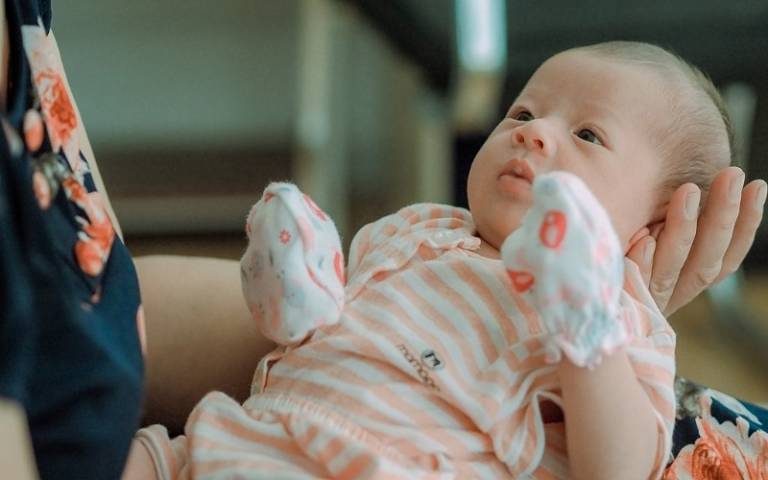Vulnerable families at risk as health visitor workloads increase
29 July 2020
Health visitors are concerned that the needs of children have been missed due to staff redeployment to support the Covid-19 workforce and increased caseloads, according to a new UCL survey.

A survey of 663 health visitors in England, conducted between 19 June and 21 July 2020, found that 41% of respondents in teams that lost staff had between 6 and 50 team members redeployed between 19 March to 3 June 2020.
In approximately 10% of teams, which experienced a loss, this was a redeployment of at least half of their staff. Few teams (9% among those with staff redeployed) gained additional staff to fill the gaps.
This meant that 253 respondents (38%) had their caseload increase, some with an increase of 50% or more, and 73% of those that experienced a change reported that their caseload had not returned to its usual size.
Dr Gabriella Conti, Associate Professor (UCL Economics and Institute of Fiscal Studies) who led the survey, said: “Whilst all families are impacted by Covid-19, the most detrimental effects are felt by those who are already disadvantaged - in particular, our most vulnerable infants and children whose needs are often hidden from sight.
“Increased caseloads for a significant proportion of health visitors, along with reports of a lack of PPE for home visits, has created a lot of additional stress and anxiety, during a time of great uncertainty and difficulty.”
The survey, supported by the Institute of Health Visiting, was carried out using the online survey platform Qualtrics. Participants (98% female, 88% White British or Irish, and average age 50) were obtained with consent from the Institute of Health Visiting database. Data collection is still ongoing and a full report will be released later this year.
Many health visitors are concerned about the knock-on effects among children and families, particularly those that are vulnerable, with 96% of respondents concerned about children in homes at risk of domestic violence and abuse. The majority were also concerned about missed needs in relation to the child’s growth (83%) and development (79%), parental mental health conditions (92%) and breastfeeding (75%).
The survey also finds that health visitors continued to provide some face-to-face meetings, but were at risk of contracting Covid-19 due to close contact with clients with symptoms and inadequate personal protective equipment (PPE).
Among those who delivered face-to-face visits, 35% reported they did not have appropriate PPE at some point, even basic items such as masks, aprons and hand gel.
The increased workload and pressures have had significant negative impacts on staff wellbeing and mental health, with 67% reporting that their stress levels had increased in the past year.
The researchers make a number of policy recommendations, including for:
- Health visiting services to be reinstated (where not already happening) to provide vital support and a safety-net for children, with appropriate measures put in place, including the use of PPE, to reduce the spread of the virus.
- An evaluation of the use of virtual, non face-to-face service delivery methods to determine their effectiveness for identification of vulnerabilities and risks, impact on child and family outcomes and reducing inequalities to inform future digital change.
- A clear workforce plan to ensure that the health visiting service has sufficient capacity to manage the backlog of missed appointments, as well as demand for support due to the secondary impacts of the pandemic.
- A proactive plan to ensure staff wellbeing during the restoration of services.
Research assistant Abigail Dow (UCL Economics), said: “A cross-government strategy is needed to reduce inequalities and “level-up” our society. This will require investment to strengthen the health visiting service which plays a crucial role in the early identification and support of the most disadvantaged families.”
Dr Cheryll Adams CBE, Executive Director of the Institute of Health Visiting (iHV), commented: “The interim results of this research into the impact of redeployment of health visitors confirms all the anecdotal evidence already sent to the iHV by health visitors. Health visitors should never have been redeployed, instead their time should have been spent on reaching the most vulnerable families during lockdown and checking in on all other families.
"If we do face a second wave of COVID-19, health visitors must not be redeployed again. Instead, an urgent workforce plan is needed to rebuild numbers in this already depleted workforce, which are at their lowest for very many years and, alongside that, tackle the huge inequities in service delivery across England, which have opened up over the past five years.
Links
- Briefing document
- Dr Gabriella Conti’s academic profile
- UCL Economics
- Institute of Health Visiting response
Image
Source: Wikimedia Commons, Credit: KAI Productions
Media Contact
Natasha Downes
+44 20 3108 3844
n.downes [at] ucl.ac.uk
 Close
Close

